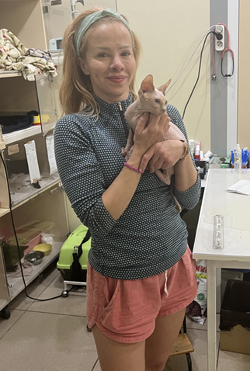Dr. Laura Coffee

Photo by Mykola Miletskyi
Dr. Laura Coffee is planning a third supply delivery trip to Ukraine. While distributing aid last month to practices in the country, she spent time at Zoolux, a specialty referral hospital in Kyiv. The kitten (pictured) was surrendered by owners who fled to Spain as Russia invaded.
Sitting in a coffee shop in Old Town, Warsaw, we juggled phones and laptops, reaching out to contacts for intel on the six-day journey through a war zone that lay ahead. It was May 11, and my second trip to the region since Russia invaded Ukraine. Together, our team — myself and a group of physicians from the United States with a collective focus on bringing aid to Ukrainian health care workers and their patients — mapped the logistics for an impending "drug run." Twenty-four hours later, I crossed from Poland into Ukraine in a supply truck, mindful of warnings from contacts in the country that missile strikes were due to rain down "on a scale not previously seen on the battlefield."
The plan was dangerous, to be sure, and I was running on resolve and adrenaline. The accounts of veterinarians in the midst of war, published in an article by the VIN News Service, were my inspiration to drop everything and fly to Kraków a month earlier, lugging four suitcases filled with donated supplies and medications. I didn't go into Ukraine during that first trip, but sent supplies through other aid workers headed across the Polish border.
This time was different.
Our six-day drive across the country revealed signs of war everywhere. We passed bomb sites and decimated villages, we slept in dark hotels with windows blocked by mattresses and scrap metal, and we visited veterinary practices staffed by exhausted doctors working 24-hour shifts with minimal supplies. We learned to work and exist amid the sounds of automatic rifle fire and frequent air raid sirens. Aid workers like myself accept a certain level of risk, but it's all relative. People in Ukraine who are in need of food, supplies and medicines face dangers on a constant basis. Volunteers like us must be willing to stand with them and share that burden.
During the longest leg of our journey, traversing the western part of the country, we pulled into a large referral practice in Kyiv, racing against the city's 11 p.m. curfew. Curfew was always at our heels, and no one dared to be out and about after the cut off, for fear of being misidentified as an enemy and shot. Tensions in the truck had been high, but as we entered the practice, a warm welcome from the front desk staff quickly melted our stress.
We unloaded about 200 pounds of medical supplies, including a plethora of expired and newly purchased injectable drugs, all donated by Washington D.C.-area veterinary practices and The Street Dog Coalition, a nonprofit for pets of owners experiencing homelessness. We were shown to the practice's basement/bomb shelter, where staff had slept on rotation since Russia's invasion. As I unrolled my sleeping bag, I noticed personal touches of the people working at the practice: a tea towel in the kitchen area, a charging station in the corner and pictures of loved ones on the bunk walls. There was even a makeshift bar, which made me smile.
At around 6 o'clock the next morning, I woke to unpack and sort the donated inventory that I had systematically stuffed into large suitcases. My process was built on efficiency. I separated wound care materials, oral medication and injectables, then sorted them alphabetically. Duplicates were grouped in fours. As I showed the bounty to the practice's chief medical officer, she placed a hand on her heart, and tears welled in her eyes. This moment justified the entire trip, and I'd do this again and again for my colleagues, stuck in a war they did not start, summoning every ounce of effort on a daily basis to treat "the least of these."
Through my experiences in Ukraine, I have learned a lot about the logistics of trying to help manage a crisis halfway around the world, in the middle of a war zone. My third trip to the country is on the horizon. This time, I have partnered with Dr. Alex Bedford and her capable staff at Providence Veterinary Practice in Virginia Beach, Virginia. Together, we aim to pilot a sustainable supply delivery and transport program that will be operational by the end of June. Our plan is to deliver 500 pounds of veterinary medical supplies to practices and nongovernmental organizations that are rescuing displaced pets.
Our operational components in Poland and Ukraine — contacts, transportation routes, places to stay and logistics — will remain in place to make it easy for other U.S. veterinary practices with devoted staff to replicate the formula. Our hope is that serial veterinary missions to Ukraine will provide reliable respite for the country's practices and shelters, for which impactful, coordinated aid does not already exist.
You, too, can help. Reach out, and I'm happy to tell you how.
About the author: Laura Coffee, MPH, DVM, DACVP, graduated in 2008 from the University of Georgia College of Veterinary Medicine and completed an anatomic pathology residency at Cornell University in 2011. Upon finishing a fellowship in aquatic animal medicine at Cornell in 2012, she worked as a wildlife pathologist for the New Jersey Department of Agriculture. She later took an anatomic pathology position at Antech Diagnostics, and also worked for Idexx Laboratories. In August 2021, she was hired by Zoetis Reference Labs and now works from her home in Potomac, Maryland. Her passion is veterinary-related humanitarian issues and she is raising funds now to embark on a third aid-distribution mission in Ukraine.